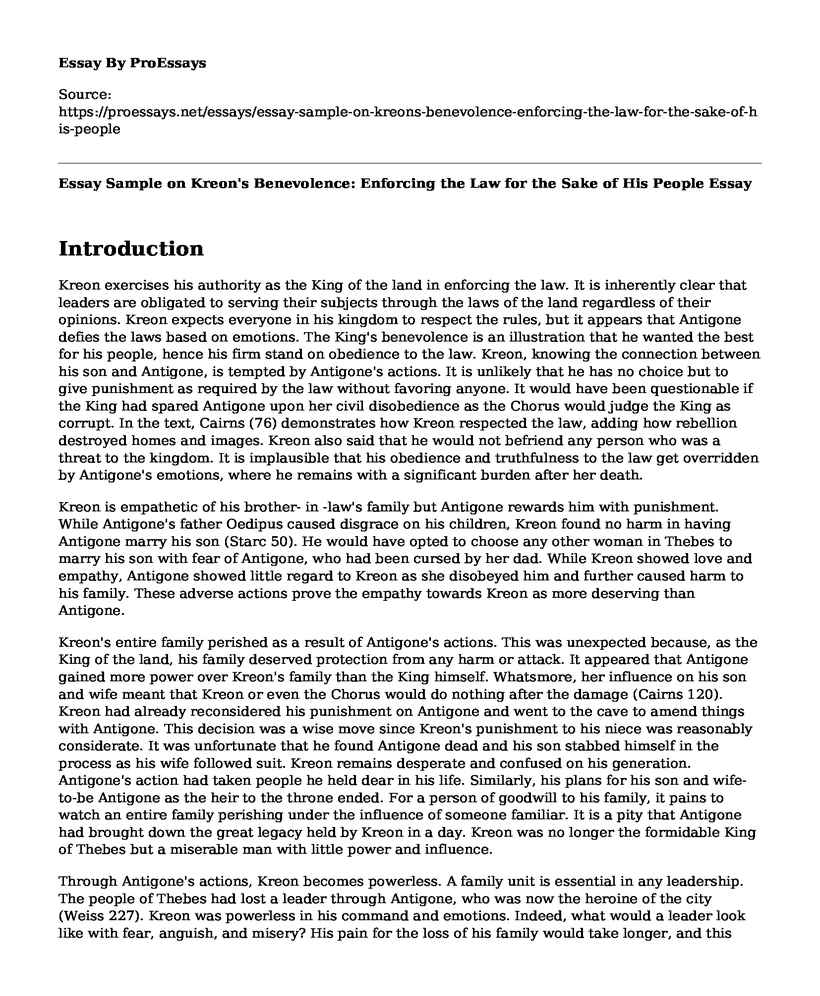Introduction
Kreon exercises his authority as the King of the land in enforcing the law. It is inherently clear that leaders are obligated to serving their subjects through the laws of the land regardless of their opinions. Kreon expects everyone in his kingdom to respect the rules, but it appears that Antigone defies the laws based on emotions. The King's benevolence is an illustration that he wanted the best for his people, hence his firm stand on obedience to the law. Kreon, knowing the connection between his son and Antigone, is tempted by Antigone's actions. It is unlikely that he has no choice but to give punishment as required by the law without favoring anyone. It would have been questionable if the King had spared Antigone upon her civil disobedience as the Chorus would judge the King as corrupt. In the text, Cairns (76) demonstrates how Kreon respected the law, adding how rebellion destroyed homes and images. Kreon also said that he would not befriend any person who was a threat to the kingdom. It is implausible that his obedience and truthfulness to the law get overridden by Antigone's emotions, where he remains with a significant burden after her death.
Kreon is empathetic of his brother- in -law's family but Antigone rewards him with punishment. While Antigone's father Oedipus caused disgrace on his children, Kreon found no harm in having Antigone marry his son (Starc 50). He would have opted to choose any other woman in Thebes to marry his son with fear of Antigone, who had been cursed by her dad. While Kreon showed love and empathy, Antigone showed little regard to Kreon as she disobeyed him and further caused harm to his family. These adverse actions prove the empathy towards Kreon as more deserving than Antigone.
Kreon's entire family perished as a result of Antigone's actions. This was unexpected because, as the King of the land, his family deserved protection from any harm or attack. It appeared that Antigone gained more power over Kreon's family than the King himself. Whatsmore, her influence on his son and wife meant that Kreon or even the Chorus would do nothing after the damage (Cairns 120). Kreon had already reconsidered his punishment on Antigone and went to the cave to amend things with Antigone. This decision was a wise move since Kreon's punishment to his niece was reasonably considerate. It was unfortunate that he found Antigone dead and his son stabbed himself in the process as his wife followed suit. Kreon remains desperate and confused on his generation. Antigone's action had taken people he held dear in his life. Similarly, his plans for his son and wife-to-be Antigone as the heir to the throne ended. For a person of goodwill to his family, it pains to watch an entire family perishing under the influence of someone familiar. It is a pity that Antigone had brought down the great legacy held by Kreon in a day. Kreon was no longer the formidable King of Thebes but a miserable man with little power and influence.
Through Antigone's actions, Kreon becomes powerless. A family unit is essential in any leadership. The people of Thebes had lost a leader through Antigone, who was now the heroine of the city (Weiss 227). Kreon was powerless in his command and emotions. Indeed, what would a leader look like with fear, anguish, and misery? His pain for the loss of his family would take longer, and this meant that he would not carry his duties as before. Moreover, Antigone became the talk of the city, which implied that the subjects had little regard in their King. It is sorrowful being in Kreon's situation since he remains alone with no one to console him, but the Chorus who expect him to dispute his authority as the King.
Conclusion
In conclusion, Sophocles' Antigone' relays essential information on aspects of the law, family, and tragedy. Actions in the play reveal how suffering or pain is imposed on individuals at the expense of others. While Kreon exercises authority as the King to impose laws that should be followed in his kingdom, he ends up suffering through the actions of Antigone, who commits suicide and causes the deaths of his entire family. It is sympathetic that the King, having power and influence, can do nothing to save the lives of his only son and wife. This further put renders him powerless as he tries to compose his emotions to rule as required. In a bid to show kindness, it is regrettable that the Kreon shows compassion to Antigone and her family but does not receive the token back from Antigone in return. Indeed, Antigone's actions are an epitome of selfishness, lacking moral cause, and meant to put endless suffering to Kreon and his leadership.
Work Cited
Cairns, Douglas. Sophocles: Antigone. London: Bloomsbury Publishing, 2016. <https://books.google.co.ke/books?id=IJehDAAAQBAJ&dq=antigone&hl=en&sa=X&ved=0ahUKEwj-qpTYpMPoAhX2ShUIHSjWDQcQ6AEIczAJ>.
Hiscock, Matthew. "Sophoclean Suicide." Classical Antiquity 37.1 (2018): 1-30. <https://ca.ucpress.edu/content/37/1/1.short>.
Starc, Mario. "Ethics and Ethical Attitude." Jung Journal 11.1 (2017): 47-52. <https://doi.org/10.1080/19342039.2017.1262683>.
Wians, William, ed. Logoi and Muthoi: Further Essays in Greek Philosophy and Literature. New York: SUNY Press, 2019. <https://books.google.co.ke/books?id=gXaZDwAAQBAJ&dq=How+is+Antigone%27s+action+not+driven+by+a+moral+cause&lr=&source=gbs_navlinks_s >.
Cite this page
Essay Sample on Kreon's Benevolence: Enforcing the Law for the Sake of His People. (2023, May 07). Retrieved from https://proessays.net/essays/essay-sample-on-kreons-benevolence-enforcing-the-law-for-the-sake-of-his-people
If you are the original author of this essay and no longer wish to have it published on the ProEssays website, please click below to request its removal:
- Research Paper on the Crime Trend for Violent and Property Related Crimes in the USA
- Essay Sample on Cyber Crimes by Cambridge Analytica
- Clinton's United Nations 4Th World Conference Speech
- Forensic Accounting: Trends in the Profession Annotated Bibliography
- Essay on Jesus on Anger: Hatred Equals Murder in Christian Beliefs
- Essay on Reforming the American Criminal Justice System: An Indictment from the Legal Academy
- Reasons for Voting - Essay Sample







